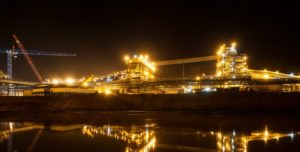Mining executives seek clarification on punitive DRC code

The Randgold Resources Kabili gold mine in the Democratic Republic of Congo, Africa. Source: Randgold Resources PLC.
By Peter Kennedy
Randgold Resources PLC [RRS-LSE] is set to meet with the Democratic Republic of Congo’s (DRC) government next week to discuss the country’s controversial mining laws.

The announcement is the latest twist in a saga that began in late January following reports that the DRC was planning sweeping changes to the mining code that are expected to have an impact on every mining project in the country.
The code is expected to bring an increase in taxes and royalties and remove a stability clause in the current law that has been protecting miners from changes to the fiscal and customs regime for 10 years.
Mining industry sources said the biggest concern was a possible 50% tax on so-called super profits, which are defined as income that is realized when commodity prices rise 25% above levels included in a mining project’s bankable feasibility study.
Industry officials are also watching to see what impact the new mining code will have on the supply of cobalt. That’s because the DRC currently accounts for about 54% of the world’s cobalt production. Any increase in the cost of doing business in the DRC may only serve to further tighten the supply of cobalt.
Sources said any amendments to the existing mining code will not take effect until they are signed into law by DRC President Joseph Kabila.
Published reports said representatives of the mining industry met with the government on Wednesday (March 7, 2018) to clarify certain aspects of the new mining code.
“The president of the republic assured miners that their concerns will be taken into account through constructive dialogue with the government after the promulgation of the new mining law,” a joint statement said.
The government agreed to continue discussions with the mining operators on issues once the new mining code has been signed into law.
Following the meeting, Mines Minister Martin Kabwelulu told reporters mining operators’ concerns would be treated on a case-by-case basis, according to a report by Reuters news service.
“After the promulgation of the code, we are going to wait for the mining companies to send us their concerns,” Kabwelulu said. “We are going to re-examine those concerns, first with (government) experts…and with the mining companies’ experts,” he said.
Rangold Chief Executive Mark Bristow said the company would start its engagement with government representatives next week.
Investors have also been advised to keep an eye out for any announcements from Swiss commodities trader Glencore AG, which stands to be hugely affected by changes to the mining code.
The code was passed by both houses of parliament last week but still has to be signed by the president before it becomes law
Speaking during a briefing for the company’s 2017 financial results, Glencore CEO Ivan Glasenberg said the new code could lead to an exodus of capital from the country if it is approved in its current format.
“The industry has got together and believes there should be consultation with us the mining industry. It is a wait and see situation as we don’t know much more than you are hearing in the press,” he told The Financial Times during an interview. “How do the motor vehicle companies feel about it? It’s a concern, I’m sure,” Glasenberg said. “We haven’t heard but I’m sure they are going to look at it and monitor just like we are doing because it is going to create disinvestment in the country if the code comes in the way it has been drafted.”
Also potentially impacted is Ivanhoe Mines Ltd. [IVN-TSX, IVPAF-OTC], which has two major projects in the DRC. They include the Kamoa-Kakula Copper Project – a joint venture between Ivanhoe Mines, Zijin Mining Group Co. Ltd., and the DRC government. Kamoa-Kakula has been independently ranked as the world’s largest, undeveloped, high-grade copper discovery by international mining consultant Wood Mackenzie.
Ivanhoe’s other key DRC asset is the Kipushi Project. It is located southeast of the Kamoa discovery and is adjacent to the town of Kipushi. Ivanhoe Mines acquired a 68% interest in the Kipushi Project in November 2011. The balance of 32% is held by the DRC’s state-owned mining company, Gecamines.
Independent research by Wood Mackenzie concludes that the Kipushi Project could rank among the world’s largest zinc mines.
